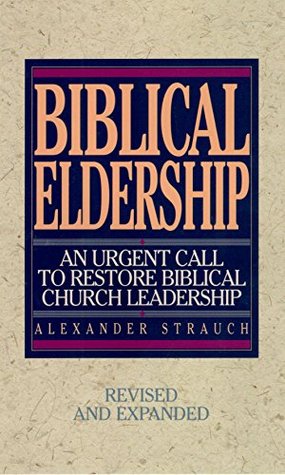More on this book
Community
Kindle Notes & Highlights
Read between
January 12 - January 12, 2022
Biblical eldership is dependent on men who seek first the kingdom of God and His righteousness (Matt. 6:33), men who have presented themselves as living sacrifices to God and slaves of the Lord Jesus Christ (Rom. 12:1,2), men who love Jesus Christ above all else and willingly sacrifice self for the sake of others, men who love as Christ loved, men who are self-disciplined and self-sacrificing, and men who have taken up the cross and are willing to suffer for Christ.
Ministry is the work of the whole church. Ministry is not the work of one person or even one group of people.
The local church is not only a flock; it is also a body of Spirit-gifted, royal priests who minister to the Lord and His people. Thus, the care of the local body is not the sole responsibility of the elders, but of all the members. Each member of Christ’s body is equipped by the Spirit to minister to the needs of others.
Like the apostles, the church elders must remember that although they are involved in ministering to practical care needs, their priorities must always be “prayer, and...the ministry of the word” (Acts 6:4).
The secret to caring for sheep is love. A good shepherd loves sheep and loves to be with them (2 Sam. 12:3).
The elders’ work is people-oriented work. If a body of elders lacks certain gifts or dynamic personalities, the elders’ love for the people can compensate for such deficiencies. There is, however, no compensation for a lack of love and compassion on the part of the elders. Without love the eldership is an empty shell.
If we choose to use the term elder, which many Protestant churches do because it is a key biblical term for church leaders, it is necessary to explain that the term elder means “pastor elders,” “shepherd elders,” or “pastors.”
As we will discover in this chapter, the New Testament provides conclusive evidence that the pastoral oversight of the apostolic churches was a team effort—not the sole responsibility of one person.
On the contrary, an eldership patterned on the New Testament model requires qualified elders who must meet specific moral and spiritual qualifications before they serve (1 Tim. 3:1-7). Such elders must be publicly examined by the church as to their qualifications (1 Tim. 3:10). They must be publicly installed into office (1 Tim. 5:22; Acts 14:23). They must be motivated and empowered by the Holy Spirit to do their work (Acts 20:28). Finally, they must be acknowledged, loved, and honored by the whole congregation.
Most pastors are not multitalented leaders, nor are they well suited to singularly lead a congregation effectively. They have personality flaws and talent deficiencies that cause them and the congregation considerable vexation. When placed in a council of qualified pastors, however, a pastor’s strengths make important contributions to the church and his weaknesses are covered by the strengths of others.
Finally, plurality of leadership allows each shepherd elder to function primarily according to personal giftedness rather than being forced to do everything and then being criticized for not being multigifted.
The orientation of shared leadership requires a great deal of patience, persevering prayer, wisdom, self-control, humility, trust, love, and genuine respect for the gifts and perspectives of others in the body of Christ. Because colleagueship is slower and more difficult than unitary leadership, most pastors prefer to work alone or with a staff under them.
We must not, in reaction to Roman Catholicism’s mistaken elevation of Peter, underestimate Peter’s outstanding leadership among the Twelve. The Gospel writers don’t.
Many sound, evangelical Bible commentators interpret Christ’s statement in Matthew 16:18 to mean that Peter is the rock and that upon him Christ would build His Church (but not exclusively upon him according to other passages such as Ephesians 2:20).
In spite of his outstanding leadership and speaking ability, Peter possessed no legal or official rank or title above the other eleven. They were not his subordinates. They were not his staff or team of assistants. He wasn’t the apostles’ “senior pastor.” Peter was simply first among his equals, and that by our Lord’s own approval.
The advantage of the principle of “first among equals” is that it allows for functional, gift-based diversity within the eldership team without creating an official, superior office over fellow elders. Just as the leading apostles, such as Peter and John, bore no special title or formal distinctions from the other apostles, elders who receive double honor form no official class or receive no special title. The differences among the elders are functional, not formal.
The New Testament provides a consistent example of shared leadership as the ideal structure of leadership in a congregation where love, humility, and servanthood are paramount. When it functions properly, shared leadership requires a greater exercise of humble servanthood than does unitary leadership. In order for an eldership to operate effectively, the elders must show mutual regard for one another, submit themselves one to another, patiently wait upon one another, genuinely consider one another’s interests and perspectives, and defer to one another. Eldership, then, enhances brotherly love,
...more
Most important, biblical eldership guards and promotes the preeminence and position of Christ over the local church.
I conclude, therefore, that the instructions given to elders and about elders, as well as the eldership structure itself, are to be regarded as apostolic directives (Titus 1:5) that are normative for churches today.


